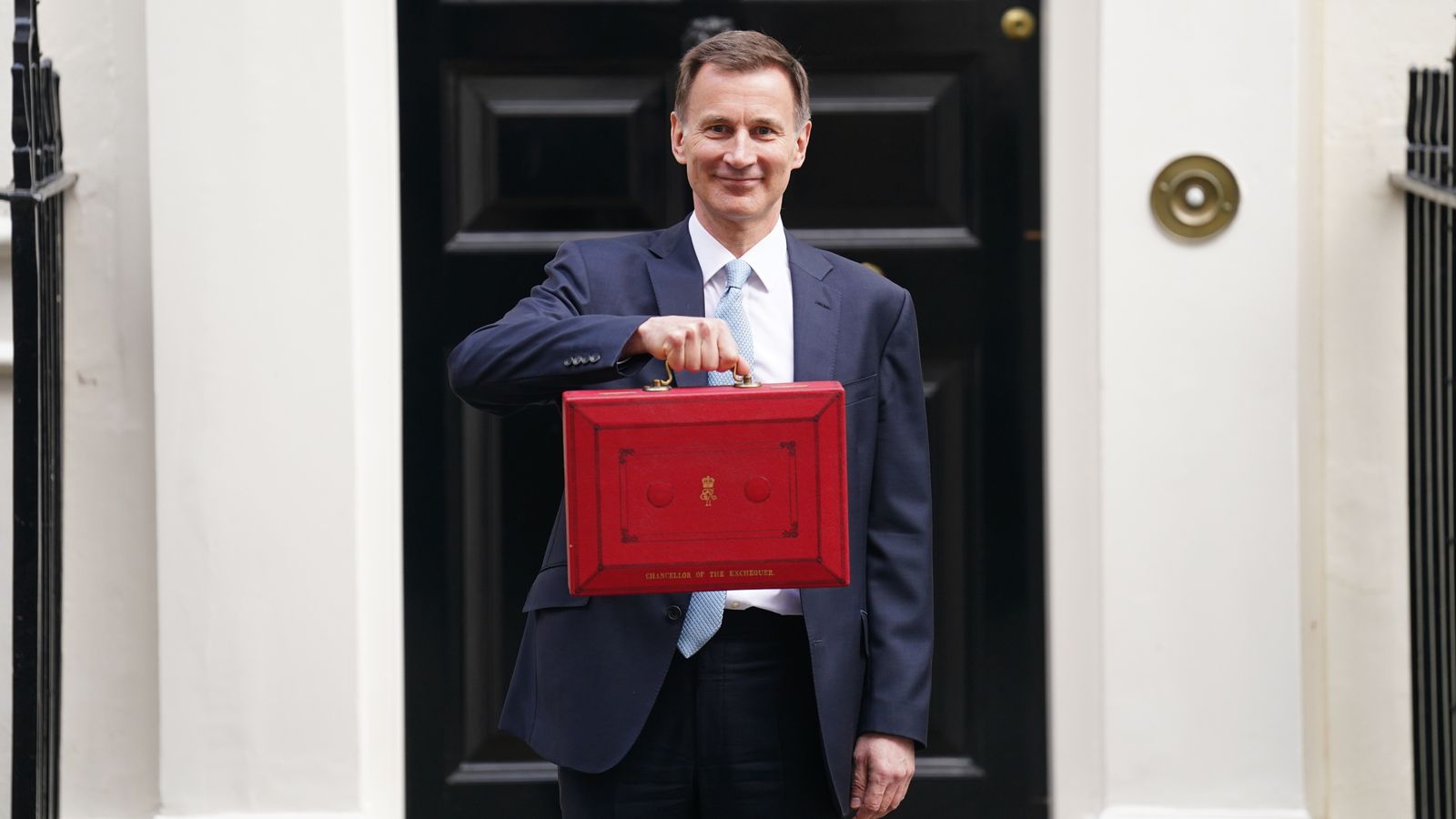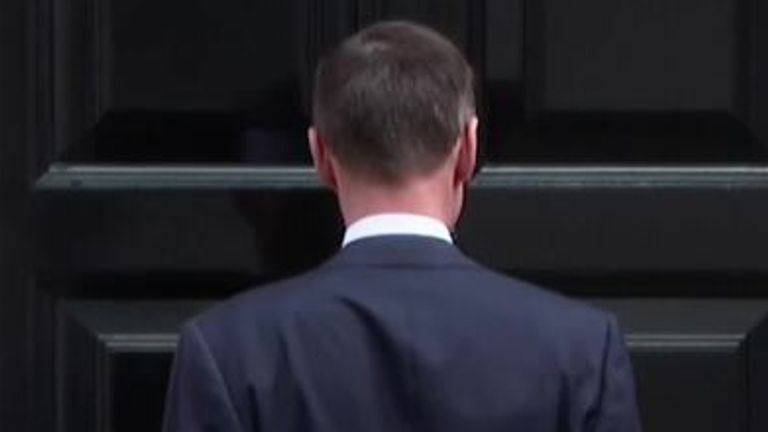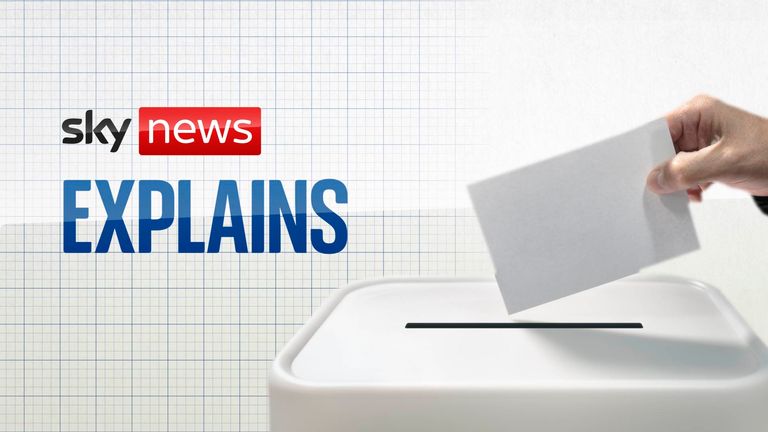Budget 2024: Chancellor abolishes ‘non-dom’ tax breaks – and confirms national insurance will be cut by 2p


The chancellor has said that the current tax system for non-doms will be abolished – and confirmed a 2p cut to national insurance.
In the budget, Jeremy Hunt said “permanent cuts in taxation” were possible because of the progress made in bringing down inflation – with forecasts suggesting it will fall to the target level of 2% within months.
Scrapping the “non-doms” regime, which allowed certain wealthy individuals to avoid paying tax on their foreign income, is expected to raise £2.7bn a year.
Budget live: No rabbit out of the hat on income tax from chancellor
Mr Hunt spoke about cutting taxes to increase growth, and the official Office for Budget Responsibility (OBR) forecast predicted that living standards will grow faster than expected.
But real disposable household disposable income is not expected to recover to pre-pandemic levels until the 2025-26 period, after the next election.
And the tax burden is also set to continue to rise – albeit at a slightly reduced level when compared to last autumn’s forecast.
In terms of spending, Mr Hunt earmarked almost £6bn for the NHS – with artificial intelligence set to be used to “cut form-filling for doctors” in a digitisation drive.
A 5p cut to fuel duty will be extended for another 12 months – with the government “backing the Great British pub” by holding the price of beer, wine and spirits steady until February 2025.
Advertisement
Meanwhile, Britons will be able to invest up to £5,000 in UK companies tax-free – in addition to their current ISA allowance – through a new “British ISA”.
Please use Chrome browser for a more accessible video player
1:57
Chancellor cuts national insurance in budget
He also announced:
• The High Income Child Benefit Charge threshold will increase from £50,000 to £60,000
• A new excise duty on vaping, as well as a one-off increase to tobacco duty
• The higher capital gains tax rate on property will fall from 28% to 24%
• The VAT registration threshold will rise from £85,000 to £90,000 from 1 April – the first increase in seven years
• A fund aimed at supporting vulnerable households with the cost of living will be extended by a further six months
• The UK economy is expected to grow by 0.8% this year – and 1.9% in 2025
• Hundreds of millions of pounds to tackle “historic underinvestment in our nations and regions”
The 2p cut to national insurance was widely trailed – and follows a previous 2p cut announced in the autumn statement. Combined, this could save the average worker up to £900 a year.
But the chancellor had faced calls from Tory MPs to cut income tax or unfreeze tax thresholds to prevent Britons from being dragged into higher bands when they get pay rises.
Please use Chrome browser for a more accessible video player

1:15
Awkward wait for chancellor outside No 11
We were promised a tax cutting budget, and we got a tax cutting budget.
The budget this year was a bit more straightforward than usual – with big announcements pre-briefed ahead of time, and no big standout measures held back to surprise voters with.
The chancellor cut national insurance by the expected two percentage points in a move that impacts 27 million people, worth £450 per year for the average person.
Capital gains tax will also be reduced, but the slightly more flamboyant move was stealing Labour’s proposals to scrap the non-dom tax status loophole and replace it with a new residency based system.
It means that an extra £2.7 billion a year will be used to fund tax breaks elsewhere in the budget.
There was a lot of pressure riding on Jeremy Hunt today among swirling chatter in Westminster of a May election, but this rather drab fiscal statement may have cooled those rumours.
But both parties could still be accused of electioneering today.
Mr Hunt thanked a list of Conservative MPs for him deciding on each measure, and even sometimes name checked constituencies.
Labour were much louder in their disagreement than usual, heckling the chancellor barely two minutes in.
The chancellor even started his speech at the despatch box with a bizarre, unrelated reference to Israel and Gaza, in a striking example of just how much the conflict has impacted UK politics since 7 October.
In terms of the immediate offerings, Jeremy Hunt confirmed the 5p fuel duty cut will continue, after it was due to expire at the end of March and confirmed a continuation of the alcohol duty freeze.
The Household Support Fund has also been extended for another six months.
There were elements in there for savers too, a new British ISA was announced allowing another £5,000 on top of existing ISA offerings and further tax relief for creative industries.
There was also a noticeable pivot back to more traditional Conservatism.
With the Conservatives 20 points behind in the polls, the chancellor must have been hoping that his budget can turn around Tory fortunes.
But today showed that for him this mission is clearly more of a marathon, not a sprint.
Mr Hunt is already facing anger from Scottish Conservatives, after he announced an extension of the windfall tax on profits made by energy companies in the North Sea.
The leader of the Scottish Tories, Douglas Ross, said he would not vote with the legislation – implying he would either oppose or abstain on the motion to introduce the measure.
Andrew Bowie, a Tory minister, said the will be “working with” Mr Ross to “resolve” the matter.
This budget is set to be the last before the election – with Mr Hunt under pressure to revive economic growth and the government’s prospects at the ballot box.
The UK economy slipped into a technical recession at the end of last year, and the Tories are about 20 points behind in the opinion polls.
Money blog: What budget means for you
Please use Chrome browser for a more accessible video player

0:59
Why don’t we know when the UK election is?
Before the budget was announced, shadow chancellor Rachel Reeves said: “The Conservatives promised to fix the nation’s roof, but instead they have smashed the windows, kicked the door in and are now burning the house down.
“Taxes are rising, prices are still going up in the shops and we have been hit by recession. Nothing the chancellor says or does can undo the economic vandalism of the Conservatives over the past decade.”
